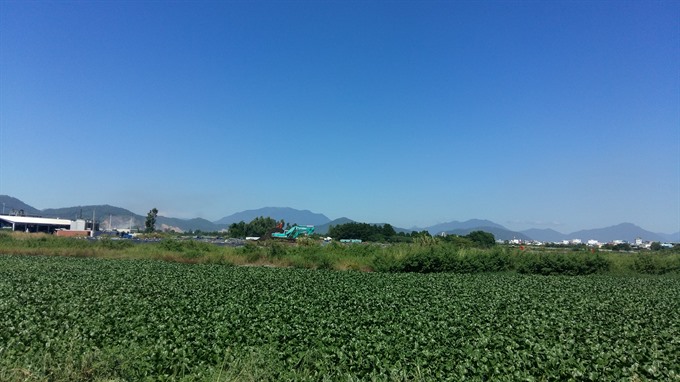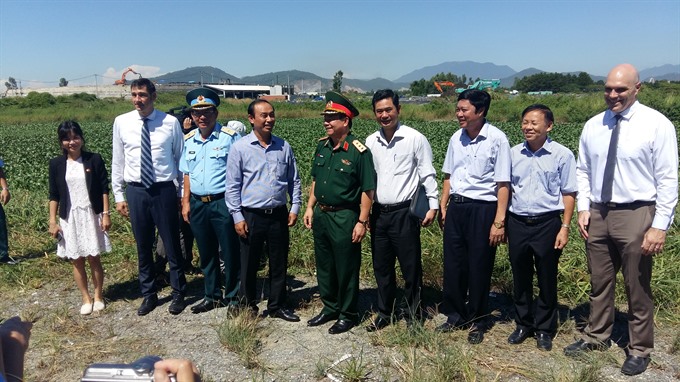 Society
Society

Over 12.7ha of remediated land at the Đà Nẵng International Airport, part of a major Agent Orange clean-up project, will be returned to the Ministry of Transport under an agreement signed yesterday.
 |
| A 12.7ha area of dioxin contaminated land has been returned to the Transport Ministry after cleaning the soil of dioxin. — VNS Photo Công Thành |
ĐÀ NẴNG — Over 12.7ha of remediated land at the Đà Nẵng International Airport, part of a major Agent Orange clean-up project, will be returned to the Ministry of Transport under an agreement signed on Wednesday.
The agreement was signed by representatives from the Vietnamese Ministry of National Defence, Air Defence-Air Force Command (ADAFC) and the US Agency of International Development (USAID).
This is the second portion of land to be turned over for new development as part of expansion of the Đà Nẵng International Airport, while USAID and the Ministry of National Defence continue their collaboration to clean up dioxin contaminated soil and sediment at the site of the former US Đà Nẵng Air Base.
“The handover of land for the second phase of the project commencing marked close co-operation between Việt Nam’s defence ministry and USAID for several years in cleaning up dioxin contamination at the airport,” said Lt. General Phạm Ngọc Minh, deputy chief of the General Staff under the Việt Nam People’s Army,.
“Today’s event also marks significant efforts made by Việt Nam and the US towards addressing the consequences of war. The project, which completed its first phase in May, had handed over a 5.97ha plot for building runways and parking lots at the airport in preparation for the 2017 Asia-Pacific Economic Co-operation (APEC) Summit in Đà Nẵng later this year,” he said.
He said the project plans to return another 16ha in the first quarter of next year for the airport expansion project.
Lt. General Minh said the Defence Ministry and USAID will continue co-operation in cleaning up dioxin contamination on 51ha at the Biên Hòa Airport in Đồng Nai Province.
He said Việt Nam and the US have also agreed to boost co-operation in landmine and bomb clearing projects as well as chemical contamination in other regions in Việt Nam.
According to the Defence Ministry, nearly 6 million hectares have thus far been identified as being contaminated with dioxin or landmines and other unexploded ordnances (UXOs).
The ministry is scheduled to start the Việt Nam-Korea landmines and bombs remediation Project next month. The project will receive US$20 million in non-refundable Official Development Assistance (ODA) from the South Korean Government.
Under this project, an area of 8,000ha will be handed over to provinces of Bình Định and Quảng Nam in 2019.
 |
| Representatives from the Vietnamese Ministry of National Defence, Air Defence-Air Force Command (ADAFC) and the US Agency of International Development (USAID) join a land handover ceremony at the Đà Nẵng Aiport on Wednesday. — VNS Photo Công Thành |
VN-US milestone
Launched in 2012, the Environmental Remediation of Dioxin Contamination at Đà Nẵng Airport Project is seen as an important milestone in the development of Việt Nam-US relations. It will also deliver a cleaner, safer environment for the residents of Đà Nẵng.
The project has successfully treated over 94,000 cubic meters of contaminated soil and sediment and is expected to complete set tasks early next year.
Việt Nam and the US have been working together to clean up Agent Orange contaminated sites in Việt Nam since 2007.
This project uses an In-Pile Thermal Desorption (IPTD) system into which batches of contaminated soil and sediment are placed in a container and heated to a temperature of 335 degrees Celsius, which destroys 95 per cent of dioxins.
The soil is later removed from the container and tested for traces of contaminants before being put back.
Đà Nẵng’s former US air base is considered a dioxin hotspot containing high levels of the toxic substance. Other such spots include Biên Hoà in the southwestern province of Đồng Nai and Phù Cát Airport in Bình Định Province.
The Office of National Steering Committee 33 estimates that there are about 148,000 cubic metres of dioxin-contaminated soil at Đà Nẵng Airport; 7,500 cubic metres the Phù Cát Airport and between 450,000 or 500,000 cubic metres at the Biên Hòa Airport. — VNS




